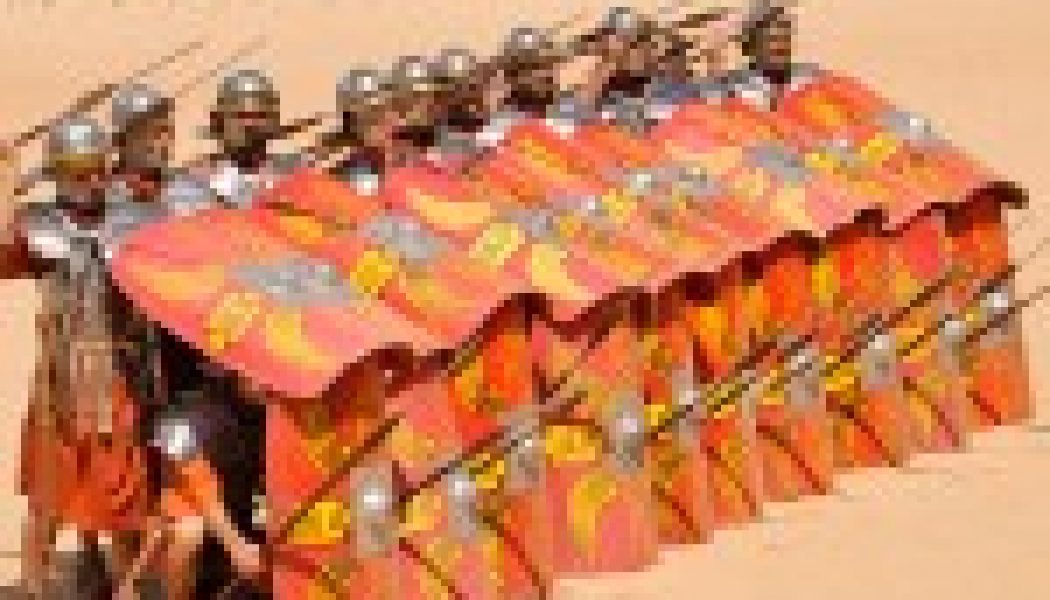This study looks at the shield of faith in Ephesians 6:16, which is another part of the armor of God.
As with all the other pieces of spiritual armor, we will first consider how the shield worked for the Roman soldier, then how the shield works for the Christian, and finally, how we can take up and use the shield of faith in our daily lives.

The Shield for the Soldier
The Greek word Paul uses for shield in Ephesians 6:16 is thureon, which is the generic word for shield, but there were two kinds of shields used by soldiers in Paul’s day.
The first, called a parma shield, was smaller and round and could be used by moving the arm to defend a certain part of the body which was being threatened. It was about 3 feet in diameter, and was the lighter of the two shields. However, while this is generally the type of shield we think about when we imagine a soldier carrying a shield, it was not the shield of choice for the Roman legions.
The shield of choice was the scutum shield. It was somewhat larger in size, nearly four feet tall and about 2.5 feet wide, and weighed over 20 pounds. The shield was made by gluing several layers of wood together, similar to how plywood is made today, and was then covered with leather for extra protection and durability.
It was not a flat shield, but was somewhat curved so that the soldier could hide behind it if needed. This curve also allowed for rocks and arrows to be deflected from the shield, rather than hitting it directly. If the shield was flat, a rock or sword hitting the shield would cause more blunt force, requiring the soldier to expend more energy in absorbing the blow. But the curve of the shield allowed a large percentage of that power to be deflected off to the side, thereby conserving the soldier’s strength.
Due to its size and weight, the soldier was not able to move this shield around very well, and so once a soldier was in position, he would typically plant it on the ground and crouch behind it for protection while darting out with his right hand to attack enemies with his sword.
 Remember, the strength and genius of the Roman military was their ability to stand firm and stay in once place on the field of battle, defending their small piece of land from any and all attackers. The shield served a significant role in this strategy.
Remember, the strength and genius of the Roman military was their ability to stand firm and stay in once place on the field of battle, defending their small piece of land from any and all attackers. The shield served a significant role in this strategy.
Due to the nature of this shield, it was sometimes referred to as a “door.” To would a Roman soldier, the enemy first had to get past the door, that is, past the shield. These shields could also be interlocked by a line of soldiers to create a nearly impenetrable wall against attacking forces. Sometimes the front line of soldiers would create this shield wall, allowing a second line of soldiers to thrust with their spears over the top of the shields at the enemies on the other side. The shields could also be raised overhead to create a barrier against arrows and rocks from above.
Often, when seeking to advance on the field of battle, a number of soldiers would create a formation called a testudo, or “tortoise,” in which the soldiers would gather close together in a tight, square group, with the soldiers on all four sides creating a wall of shields, and the soldiers on the inside raising their shields above to protect from arrows and rocks.

In this way, they could advance onto almost any area of the battlefield with minimal damage, or even up to the gates of a city to set it on fire or to start tearing them down with a battering ram.
In this way, the shield also helped the Roman soldiers work together as a unit. The shields not only protected the soldier himself, but also the soldier on either side of them. The soldiers, remember worked as a band of brothers, as a unified whole, and the shields were one of the primary methods of defense for the soldiers on the shield of battle.
When a soldier fell, the two soldiers on either side would close ranks, protecting their fallen comrade from further damage, while the soldiers behind would drag the fallen soldier backward into safety and protection. So the shields were extremely effective in helping maintain unity and mutual protection among the soldiers.

Finally, the center of these shields often had a raised mound of bronze or iron that could be used as a weapon. The shield could be raised and bashed into the chest or face of an enemy soldier, causing blunt force trauma, possibly disabling the other soldier.
In light of all this, Paul’s choice of words in Ephesians 6:16 is interesting. He introduces the shield in a way that is unique from the other pieces of armor. He says, above all, taking the shield of faith. Some Bible translation say, “in addition,” which loses some of the force of what Paul appears to be saying. When Paul talks about the shield, he is not just writing about another piece of armor we are to take up and put on. He wants this one to be above all.
This doesn’t mean the shield is the most important piece of armor, for all of the pieces are critically important. Instead, Paul means that the shield is above all, over all, before all, or in front of all. The shield is the first line of defense for the Roman soldier. It was “the door.” You can’t get to the soldier unless you first all get past the door.
To get to any other piece of the armor, or to get to the soldier himself, the enemy had to get past the shield first. The shield not only protected the body of the soldier, but the other pieces of armor as well. Since the shield was over all, in front of all, and above all, the shield protected everything.

Specifically, Paul says in Ephesians 6:16 that the shield is the primary form of defense against the fiery darts of the wicked one. These fiery darts Paul writes about were the most advanced weapons in Paul’s day.
Archeologists have discovered that some arrows and spears had tips made of a combustible material which was then lit on fire and shot or thrown into the enemy forces where it would ignite or even explode. Military forces also used some arrows and spears with hollow tips which were then packed with this combustible material. When it struck a soldier or a shield, it would splatter and burn.
This was before the days of gunpowder, so these weapons were ingenious and effective at decimating enemy forces. These fiery darts came in quickly so they were hard to see, and when they hit, they would burn or explode.
But Paul says that the shield is effective at quenching the most dreaded and cunning weapons of his day. They come in too quickly to react, but if the soldier has his shield in place, then he doesn’t need to see the flaming darts, for the shield will stop them.
In this way, the shield protected the Roman soldier from all sorts of attacks; the swords and spear attacks he could see, the rock and arrow attacks from above, and the flaming dart attacks that came in too quickly to see. The shield was above all and over all, protecting the soldier himself as well as the soldiers on either side.
So that how the shield worked and functioned for the Roman soldier in Paul’s day. Let us now consider what the shield is for the Christian.
The Shield for the Christian
 Paul states in Ephesians 6:16 that the shield is faith. He instructs us to take up the shield of faith. So what is faith? How do we get faith? And how do we know that we have faith? For example, since Scripture tells you to believe in Jesus for eternal life, how do you know that you have really believed? I have written a book on the topic of faith, which answers these sorts of questions in much more detail, but let me summarize the content of that book for you here.
Paul states in Ephesians 6:16 that the shield is faith. He instructs us to take up the shield of faith. So what is faith? How do we get faith? And how do we know that we have faith? For example, since Scripture tells you to believe in Jesus for eternal life, how do you know that you have really believed? I have written a book on the topic of faith, which answers these sorts of questions in much more detail, but let me summarize the content of that book for you here.
Many people are confused about what faith is, how faith works, and how to know if they have really believed something. Part of this confusion is because there are numerous popular illustrations used to describe faith which really only just obscure the reality of faith.
There is the illustration of the man pushing a wheelbarrow across Niagara Falls, saying that unless people get into the wheelbarrow with him, they don’t really believe he can do it. There is the illustration of faith as a deck of cards so that if you pull one out, the entire deck comes tumbling down. There is an illustration about faith being one wing on an airplane, with good works being the other wing, so that you need both to properly fly. All of these illustrations mislead and confuse people about the true nature of faith.
Then there are adjectives used to describe faith, such as head faith, heart faith, temporary faith, spurious faith, false faith, small faith, great faith, and numerous others which usually only create confusion about the nature and character of faith. Curiously, only two of those—small faith and great faith—are biblical and even these two are widely misunderstood and misapplied.
So what is faith?
 Faith, as taught in the Bible, can be defined as a reasonable certainty about any truth claim or statement of fact.
Faith, as taught in the Bible, can be defined as a reasonable certainty about any truth claim or statement of fact.
In other words, if you know that something is true, then you believe it. We believe, or have faith, when we agree or give assent to a factual statement.
If you know that the earth is round, then you believe the earth is round. If you know that 2+2=4, then you believe that 2+2=4. If you know that the sky is blue, then you believe that the sky is blue.
So we have faith about something when we know it to be true. I know this explanation might raise more questions than it answers, and if so, I direct you to my book, What is Faith? Let us turn now to see how to get faith, grow our faith, and know that we have faith so that, as Paul writes, we can quench all the fiery darts of the wicked one.
And what are these fiery darts of the wicked one? While looking at how the shield worked for the Roman solider we also briefly considered how the fiery darts and flaming arrows functioned on the field of battle, so what are these fiery darts for Christians in spiritual warfare?

Since the wicked one is a reference to Satan and the wicked forces that Paul mentioned in Ephesians 6:12, the fiery darts are the weapons that Satan uses to trick and deceive us.
We previously discussed the one tactic and the three types of temptations the devil uses in sending these temptations. The wicked forces arrayed against us always questions the promises of God in an attempt to get us to fall prey to the lust of the flesh, the lust of the eyes, and the pride of life.
Yet even though we know what sort of weapons these wicked forces use, it doesn’t mean that we are always ready for them when they come. They are fiery darts that come in quickly and without warning.
Sometimes they come one at a time, like sniper fire from afar, while other times they fall in a heavy barrage, as a storm of arrows falling from the sky. When the hit, they are painful and destructive, causing great devastation in our lives.
Thankfully, the shield of faith causes the flaming darts to lose their fire and their force. The shield is able to protect us from each and every one of the trick, traps, and temptations that the devil sends our way. Not just some of them, but all of them.
And the shield doesn’t just stop the arrows; it is able to quench them. It snuffs out the flame of the fiery darts so that when they strike the shield, the shield does not burn, but remains intact and able to defend us on the field of battle.
But, just as with all the other pieces of armor, this protection is not automatic. Just as we have to put on the belt of truth, the breastplate of righteousness and the sandals of the gospel, so also we have to take up the shield of faith.
Taking up the Shield
Before we look at how to take up the shield of faith, it is important to be reminded that, just like all the other pieces of armor, this piece also is from God’s armory. The image of faith as a shield is everywhere in Scripture, but with a small twist.
For example, when we read that Abram believes God and his faith was credited to him as righteousness, we are told in Genesis 15:1 that God Himself will be Abram’s shield. God will protect Abram as Abram places faith in God.
We find this same idea throughout the entire Old Testament. The concept of God being our shield when we place faith in Him is found at least twenty times in the book of Psalms alone. Over and over again, God is described as our shield and fortress, the One who protects us from the enemy. In Psalm 91:4, God’s faithfulness itself is described as a shield, and in Psalm 76:3 we read that God breaks the arrows of our enemies. In Proverbs 30:5, we read that God is a shield to those who put their trust in Him.
So the little twist or surprise in Ephesians 6:16 is that when Paul tells us to take up the shield of faith, we learn from the Old Testament that the shield is actually God Himself. When we believe in Him and His promises, it is He Himself that protects us.
Think about what this means.
Remember that the shield Paul has in mind was like a wall, or a door, behind which the Roman soldier hid. The shield was considered to be the first line of defense. For an enemy to get to the soldier, the enemy first had to get past the shield.
But with God as our shield, what have we to fear? Nothing! There is nothing that is large enough, powerful enough, or strong enough to get past God when He has set Himself to protect us from harm.
Therefore, as Christians, we have nothing to fear from Satan, or wicked men, or future events. God is on our side. To get through to the other pieces of armor, the enemy has to get past God first.
As Paul writes in Romans 8:38-39, nothing in death or life, among the angels, principalities, or powers, in the present or the future, in heaven above or the depths below, nor any created thing, can separate us from the love of God in Christ Jesus. He shields us and protects us from all such things.
Like the shepherd protecting the sheep in the pen by laying himself down as the door so wolves have to go through the shepherd to get to the sheep (cf. John 10:11-18), so also any fiery dart of temptation that comes our way has to first go through God, because He is our shield; He is our door.
 When temptations do get through, and when we get wounded by the fiery darts of the devil, it is because we have dropped our shield. The only way the fiery darts of temptation get past the protective shield of God is when we have not properly taken up the shield of faith, as Paul instructions in Ephesians 6:16. When the shield drops, when we let down our guard, it is then that the fiery darts are able to get through and wound us.
When temptations do get through, and when we get wounded by the fiery darts of the devil, it is because we have dropped our shield. The only way the fiery darts of temptation get past the protective shield of God is when we have not properly taken up the shield of faith, as Paul instructions in Ephesians 6:16. When the shield drops, when we let down our guard, it is then that the fiery darts are able to get through and wound us.
So how do we take up the shield, and how do we keep it up? Since this is the shield of faith, we take it up by believing in what God has said. The more we believe, the more effective our shield becomes at protecting us from the fiery darts of the wicked one.
As we believe in God’s Word, God’s promises, and the truth revealed by God in Scripture, we are taking up the shield of faith and gaining the protection God provides.
But this is where the problem begins, because some people think that faith has to be “all or nothing.” I have talked with numerous people throughout the years who want to believe the Bible and what God has said, but there are some things in the Bible that they just cannot believe, such as the idea in Genesis 5:27 that Methuselah lived to be 969 years old, or that the world was created in six days (Gen 1), or that an ax head could actually float on water (2 Kings 6:1-7).
Some people don’t believe in God or some of the various truths of Scripture because they cannot believe that God would allow bad things happen in this world, or that God wants blood sacrifice and commanded the genocide of the Canaanites (I don’t believe God wanted the genocide of the Canaanites either … but I do believe God wanted the historical record of Canaanite genocide in the Bible… I will explain why in a future book).
And since they cannot believe some of these more difficult truth claims of Scripture, they decide they cannot believe any of it. They stop believing in God, in Scripture, and in what Jesus has showed us through His life, death, and resurrection. As a result, they drop their shield of faith entirely, and leave themselves open to the attacks of the devil.
But thankfully, faith does not work like this.
Biblical faith is not an “all or nothing” house of cards. It is completely possible to believe some, or many, of the things taught in the Bible, while being unsure about, or even not believing, many other ideas and concepts of the Bible.
Nobody becomes a Christian by knowing and believing everything in the Bible.
We become a Christian by knowing and believing a few simple facts about God, ourselves, and Jesus. We become a Christian by believing in Jesus for eternal life. Our shield of faith strengthens as we build upon these facts over time and as we come to learn and believe more truths from Scripture.
In other words, our set of beliefs grow over time as we follow Jesus on the path of discipleship and as believe more of what God has revealed in the Bible.
 So to grow our faith, to walk by faith, to live by faith, and to take up the shield of faith, we must begin with the facts and truths we know to be true, and then build upon these ideas with more truths and ideas from Scripture.
So to grow our faith, to walk by faith, to live by faith, and to take up the shield of faith, we must begin with the facts and truths we know to be true, and then build upon these ideas with more truths and ideas from Scripture.
Building our faith in this way allows our faith to act as a shield against the tricks, traps, and fiery darts of the devil. Our enemy tries to get us to doubt God’s promises and fall into the pitfalls of sin.
When we begin to think that God cannot love us because of what we have done, we can remember the promise of God in Romans 8:38-39 that nothing, absolutely nothing, can separate us from the love of God.
When we are tempted to think that God cannot forgive some sort of sin we have committed, we can remember the truth of Scripture that God has already forgiven us for all sins we have committed, past, present, and future (Col 2:13).
If you ever begin to wonder if you matter to God, all you need to do is believe the promises that God knows your name (Isa 43:1), knows every detail about you, even to the point of numbering the hairs on your head (Luke 12:7), has specifically gifted you with special talents and abilities so that you can serve a significant role in His plan for the world (1 Cor 12; Rom 12; Eph 4; 1 Pet 4), and wants nothing but the best for you and your life and He works nonstop to bring these good plans to fruition in your life (Prov 3:5-6; Heb 13:20-21; Jas 1:5).
When temptations to sin come our way, we can believe the promises of God that sin only leads to destruction (Matt 7:13-14; Rom 6:23; Jas 1:15).
When we face doubts about whether or not we have eternal life, we can remember the numerous promises of Jesus that anyone who believes in Him has everlasting life (John 3:16; 5:24; 6:47).
 Do you see? As we come to learn and believe these promises of God, they become a shield and a barrier protecting us from all the lies of the devil.
Do you see? As we come to learn and believe these promises of God, they become a shield and a barrier protecting us from all the lies of the devil.
Faith in the promises of God keeps us bold and strong in the face of sin, temptation, and doubt. This is why faith is so important to our life as a Christian.
Believing what God has said is the shield that protects us from the darts of the devil which question and challenge what God has said.
So where are you at with your faith? What is it that you believe? Start with the basics, and then go from there.
For example, do you believe that God exists? This is a basic biblical belief, but many people are not sure that there is a God. But a person cannot move on to believe much of anything in the Bible until they first believe that God exists. Thankfully, there are ways to learn that God does indeed exist, such as books on apologetics and various evidences for the existence of God.
And once you come to believe that God exists, you can move on from that belief and add further beliefs to your system of beliefs. You will come to believe that God wants to communicate with humans, as He has done in various ways, such as through Jesus and the revelation of Scripture.
You will come to believe that Jesus is God in the flesh, and that Jesus explains how to receive eternal life and live this present life in the best way possible. You will learn how to treat other people with love, grace, and forgiveness.
As you learn all these things, you come to believe them, because you see that they are true. And as you develop this ever-widening system of beliefs that are based on the truth reveled in Scripture and through Jesus Christ, your shield of faith becomes ever-more effective at protecting you from the fiery darts of the wicked one.
The temptations and doubts he shoots at you are quenched before they can reach your mind and heart.
God, as our shield, protects us from all harm. Living by faith in the promises of God eventually allows you to walk by faith in what God has said He will do, for you know that God is on your side and God will do what He has said.
So take up the shield of faith. Believe in what God has said. Then go forth with the certain knowledge that victory is at hand.
 Do you want to learn about spiritual warfare and how to put on the full armor of God? If you want to defeat sin and gain victory in your life over temptation so you can better follow Jesus, take my course on the Armor of God as it is explained in Ephesians 6:10-20.This course costs $297, but when you join the Discipleship group, you can to take the entire course for free.
Do you want to learn about spiritual warfare and how to put on the full armor of God? If you want to defeat sin and gain victory in your life over temptation so you can better follow Jesus, take my course on the Armor of God as it is explained in Ephesians 6:10-20.This course costs $297, but when you join the Discipleship group, you can to take the entire course for free.










